- Home
- Chris Ryan
Flash Flood Page 10
Flash Flood Read online
Page 10
Vicky was aware of the anaesthetist and a nurse at the patient’s head and she suddenly had a terrible thought: what about the anaesthetic or whatever was keeping the patient asleep? Would that fail without the power?
The nurse finally grabbed a head torch from her and went hunting in the cabinets. She brought back a loaded syringe and injected it straight into the patient’s drip.
Finally the surgeons got control of the bleeding and Vicky was allowed to move away and distribute the other torches.
When she stumbled out of the theatre, she felt sick to her stomach. As she struggled to calm herself down, she told herself she was lucky. She could have been down in casualty or outpatients, or working in the morgue. They had been completely flooded. No one knew what had happened to the patients and staff there.
One by one, the patients in the theatres were closed up and wheeled out. Their operations would have to be performed again later. All the surgeons could do was sew up cut vessels, repair the holes they had made in muscles, stitch together the skin.
Now each of those patients lay in a recovery room, a theatre nurse standing over them, checking their progress. One of them had stopped breathing after the operation, and had to be resuscitated by hand. A nurse was bending over him, squeezing a bag that pushed air in and out of his lungs.
When Vicky had visited operating suites before, they had been busy places, full of bustle and the background hum of machines. Machines that made a soft hissing as they breathed for the patient, bleeped quietly as they monitored heart and brain activity. There was none of that noise now; it was silent and eerie. The only sound was the rhythmic hiss of the ventilating bag.
As Vicky walked past another recovery room, she saw the nurse’s head in a ghostly circle of light like a halo; she was checking the patient’s pulse with a worried expression. The nurse saw her light and called out to her. ‘Vicky, can you get Doctor Okanga to dispense me some more morphine? I think he’s coming round.’
‘Yeah, sure.’
She hurried along to the pharmacy. This was the moment she had been dreading. When the poor, hastily patched-up patients came back to consciousness.
And would they have to evacuate? If the flood waters rose any higher, would they have to move the patients elsewhere? Surely they could not stay in a hospital without power … ?
Chapter Twenty-one
Ben thumped hard against the door with his shoulder but the bolt was solid and it held. The sound reverberated around the cellar.
Was that another sound – something in the water? Not for the first time, he peered down into the gloom, trying to see how deep it was, But he couldn’t see anything. The cellar was black.
He would have to try and take a run at the door. He stepped down gingerly, feeling his way with his feet. He’d have to be careful otherwise he’d fall down the stairs.
He launched himself up at the door and hit it with his shoulder.
It hardly moved.
Ben listened for a moment. Maybe the sound of him trying to break out would bring somebody. He shouted out.
Suddenly he heard a voice. No, it was only the radio, still broadcasting reassuring messages. The voice seemed to have been chosen specifically to sound authoritative and soothing, like a drug. ‘This is the BBC, coming to you from our Manchester studios. All other services have been suspended after the flooding in the capital today. Scheduled programmes will be repeated at a future date. For details you can check our website, which we hope will be back on line shortly.’
How absurd, thought Ben. Criminals might be roaming the streets of London, Big Ben might have stopped, but BBC Radio was thinking about an orderly future, with The Archers and The Chart Show.
He needed a longer run-up. He turned round, put his right shoulder against the wall and felt his way down the stairs very cautiously. One, two, three.
There was something on the fourth step; he tripped and lost his balance, stumbling into the dark. Horrible images flashed through his head – stories about people falling to their deaths down cellar steps. He crashed onto his shoulder and rolled on down. Instinct made him tuck his head in, protect it at all costs.
He was suddenly engulfed in freezing water. He cried out and his mouth filled with that same foul taste he’d choked out earlier that day. He flailed around, as if trying to wake from a nightmare. Then his feet found solid ground.
He stood up and started for where he thought the stairs were, but then realized he hadn’t a clue what direction to take.
Deep breaths, he told himself. Panicking will definitely get you drowned.
The water was up past his waist here. It chilled him to the bone. Where had it all come from?
This street wasn’t underwater – the flood started at least a street away – it must be seeping through the ground, through the basement levels. Perhaps through a drain or an underground river. He forced himself to be calm. He needed to be able to see where he was going. In a moment his eyes would adjust.
Ben’s patience paid off. He saw a gleam of light and waded over to it.
He came up against a wall, but at his eye level there was a hole. When he looked through, he saw a crawl space under the floor above, and daylight.
So the cellar didn’t go the full length of the building. He saw a bank of bare earth and foundations like rough brick pillars resting on them. There was light coming through – enough for him to see the wood grain of the floorboards of the ground floor above. It smelled dank and rotten. There seemed to be debris in there too – crisp packets and polystyrene burger boxes – but that was a good sign: it must have blown in from the outside. And that definitely meant a hole. The space itself looked tight, but he reckoned he could crawl through.
Ben realized that, in the time he’d been standing there, the water level in the cellar had risen. It was now nearly up to his armpits.
No time to waste, then. He put his hands on the rough brick sill of the crawl space and hoisted himself up. With so much buoyancy from the water it was easy, like vaulting out of a swimming pool. He wriggled into the space on his stomach, then pulled himself along on his elbows. It was cramped, like crawling under a bed, but not too bad if you kept your eyes on the light.
A squeaking, skittering sound made him start in alarm. He recoiled and banged the back of his head on wooden floorboards.
Something was in there with him.
Suddenly Ben could see small points of light, like sequins. They flashed at him, then moved away.
What were they?
Something brushed past his arm and he heard the squeaking again. This time he saw more sequins of light, some of them blinking at him. Then he saw torpedo shapes running about, then stopping abruptly. Tails flicked in the gloom.
The crawl space was full of rats.
Ben went cold all over. What was this under his hands? It felt like earth, but was it rat droppings?
He felt bile rising in his throat. He wanted to turn round and go back there and then. But this was the only way out of the cellar.
All at once Ben felt a sense of hopelessness rising in him. He cursed Bel, wished she could see what he was having to go through because she’d mucked him about. He’d certainly give her all the horrid details. No, that would be pointless. She would probably say she’d had to do worse before her press conference after the tsunami in Phuket, or something similarly unsympathetic.
Ben realized he’d already battled against worse today, when he slipped off the raft into the water. This wasn’t nearly as hard; just disgusting. He had to just pick a goal and work towards it.
The opening had a pattern over it, like some kind of mesh. More importantly, it was ten metres – four brick pillars – away. He kept his eyes on that light, and pulled himself along with his elbows.
Tiny squeaks and squeals flitted at the corner of his consciousness. Clawed feet ran across his bare hands. Scaly tails lashed his face. They touched his lips and he spat them out, swearing, trying not to think what would happen if the rats bit him
.
He passed one brick pillar. Good. That was a landmark.
A furry body brushed against his nose, filling his senses with the smell of wet rodent. Despite his resolve, he almost turned round, only there wasn’t room.
That was when he started to realize how tiny the space was. The floorboards above, the pillars of brick to the side, the earth under his belly. He might get stuck here and die. Die, and be food for the rats.
He passed another brick pillar. The ground was getting wetter, slimier. Obviously the rain was coming in, but that was a good sign: it meant he was getting closer to outside.
The tiny eyes watched him as the rats skittered to and fro across his path. Look all you want, he thought. Soon I’m going to be out of here.
Slowly Ben passed the third pillar. Daylight was just a few metres away. Unfortunately, in front of him he saw a mass of small brown bodies. They stopped and looked at him: tails, ears, rodent faces. For some reason these rats didn’t run away. It was like they knew they didn’t have to be afraid of him: he was in their underworld and was vastly outnumbered. He saw their teeth and had a vision of them swarming towards him, to pick his bones clean.
Well, they’d have to get through his jeans first. And a rather expensive Burberry mac.
Then suddenly, as Ben focused on the opening ahead, he saw what it was, and all the fight went out of him.
It was merely a row of air bricks, designed to ventilate the underside of the building. From a distance it looked like a big hole with a mesh like a radiator cover, but up close it was solid bricks with a honeycomb pattern. There was no big hole.
The rats scurried around him, squeaking. Two of them sniffed at his hands. He struggled not to shake them off in case they bit him. Claws danced across his legs, his back.
Now what could he do? He was stuck under a building, in a stinking den of rats.
He’d have to go back.
With difficulty he turned round, squirming like a snake, the rats finally scattering out of his way. He’d have to try the cellar door again, he thought, before the water level got any higher. Before the water level rose so high that it flooded the crawl space too.
Painfully Ben pulled himself back towards the cellar. He was heading into the dark, and now his night vision had been bleached away by the glimpse of daylight. He hoped his eyes would adjust by the time he got back to the cellar.
Long before he had expected to, his hand found the cellar wall. Oh well, that had gone much more quickly than the outward journey. He put his hands out, still unable to see. Where was the hole?
He felt along the wall. Where was it? He shifted his body to try and let the light from the airbricks past. A tail swished in front of his face. Where was the hole?
He saw more light over to the right-hand side. That wasn’t the cellar but it was better than nothing. Maybe it was more airbricks.
He pulled himself over to them.
The ground was becoming slimy again. He stopped and thought for a moment. He’d gone round in a circle. It was the same airbricks he’d found before. There was the same damp patch with the marks where he’d turned round. Now he was losing his sense of direction.
The rain pattered on outside, mocking him, as if to say, It’s all out here, you just have to work out how to reach it.
He let his head sink onto his forearms. What could he do now?
He might have stayed there and given up if the smell hadn’t been so disgusting. He lifted his head again. Think, he told himself. You’ve had a panic, but that’s over now. There must be a way to get out.
In the light from the airbricks Ben could see that his hands and the sleeves of the Burberry were caked in mud. Wet slimy mud and drier earth from the area nearer the cellar.
That set a spark off inside his head. The ground near the front of the building was wet. Near the back, the cellar entrance, it was dry. He could get back to the cellar wall if he kept feeling for dry ground.
He squirmed round again. He felt a rat’s whiskers tickling his cheek, its body solid, like a furry tennis ball. He tried to ignore it and concentrate on the task at hand.
He would do this systematically. He would pull himself forwards on his elbows, then check the ground. One pull, then he checked. Yes, it was drier. Another pull forwards. A burger wrapper stuck to his hands. He shook it off and scrunched it into a ball, then felt the ground. Dry. He was going in the right direction. Now he was using his brains: he was going to beat this.
It was then that Ben noticed the light coming from the right-hand side. It was fainter than the light from the air brick at the front, which was probably why he hadn’t seen it before now.
He weighed up the options. Light was more promising than no light. He squirmed over to it.
It was a hole – a round tunnel of some kind like a sewage pipe, with a smooth inner surface, but big enough to get his shoulders into. Which meant the rest of him would go in too. The light wasn’t directly ahead but reflecting off the wet inner surface of the tunnel. Several rats came down it, their claws skittering on the surface. He waved his arms and they turned and shot away, back the way they came.
Why hadn’t he thought about that before? The rats must have found a way in somehow, and they couldn’t have come through the airbricks.
He squeezed into the space. A purple cable ran along one side. After the dank squalor of the crawl space the purple plastic was a reassuring connection with the civilized world. The light was dim but definite, and such a relief.
Ben noticed that the bottom of the pipe was covered in a thin sheen of mud. More rats came along and sniffed at his fingers and then his face. He didn’t want to open his mouth with them so close so he blew out through his teeth at them and made a strange humming noise to scare them away.
His elbows began to feel tighter against his sides. His shoulders too. He had to hunch his head down more.
The space seemed to be getting smaller, or was it his imagination? Would it get too small for him? Would he get stuck in the tunnel?
Maybe he should have gone out through the cellar. Now he might not be able to get back at all.
Suddenly a breeze of fresh air stirred Ben’s hair. Water was trickling down the tunnel, making a pattern in the silt along the bottom. It must be coming from outside. And it was definitely lighter or he wouldn’t have been able to see that. He must be nearly out.
He felt air move above his head again. Cautiously he looking up, fearful of banging into the roof.
Then he realized there was no roof. Above his head was rain and air. He could see the sky and scaffolding. He was in a building site.
But it wasn’t a way out. The hole in the tunnel was only about twenty centimetres long, not nearly big enough to get through. The tunnel was composed of half-cylinder sections and one of them had been lifted so that the cables could be fed in.
Ben pushed at the other segments but they were securely cemented in place and he couldn’t get enough leverage to move them. He called out. His cries rang around the walls but no one came. All he could do was look at the big empty space above him and feel the rain on his face, as if he was stuck in a bizarre open coffin.
Chapter Twenty-two
The policeman was on his way back to the entrance of St Paul’s Cathedral, carrying cups of tea for himself and Canon Victor Dibben. Out in the streets, car alarms and burglar alarms sang. A double-decker bus stood at the top of Ludgate Hill, abandoned. A few metres away, the river lapped at the bottom steps. St Paul’s was on a hill and had just escaped the flooding. Now it was full of people taking refuge inside.
As the policeman rounded the corner and started up the steps, he saw that the Canon was speaking to a man outside the entrance.
‘Come inside,’ he was urging him. ‘It’s warm.’
‘I don’t need to come in,’ said the man in a Spanish accent. ‘I just need to get to Charing Cross Station. Where is it, please?’
It was more than an hour since Rebro had shut down and the policeman’s radio wa
s no longer functioning. The CCTV cameras in the area would have lost power long ago. Moreover, he’d lost his partner. He felt very alone.
Especially now – for he suddenly realized that there was something very strange about that man asking Canon Dibben for directions.
His hands were thrust deep into the pockets of his checked coat, and he looked as if he must have been walking for a long time: his black hair was plastered against his head, his clothes soaked.
Nothing unusual about that – so what was it that was making the policeman’s instincts prickle?
From the interior of the great building came the sound of several hundred people, talking softly, moving around. Crowds of them had come in to shelter from the rain, but this man was asking for directions to Charing Cross Station. Was that what was odd, that he preferred to remain outside? Everyone else who had staggered up the steps had been exhausted, seeking only warmth and something to eat.
Then it hit him – and he automatically tried to contact his station on the radio before he remembered he couldn’t: it wasn’t working. He was sure that a picture of the man the Canon was talking had been circulated around the stations that morning. He was José Xavier, a Basque separatist terrorist who had been arrested last night along with his accomplice, Francisco Gomez. The two of them had been taken to separate police stations to await transfer to the high-security station in Paddington Green for questioning.
But if it was indeed Xavier, where were his handcuffs? Maybe he had escaped before they had managed to cuff him.
The policeman decided to stay out of sight and went back down the steps. If the terrorist saw his uniform, Canon Dibben might be put in danger.

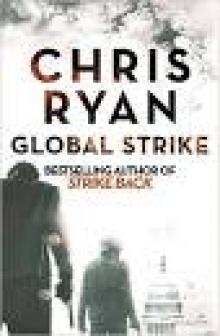 Global Strike
Global Strike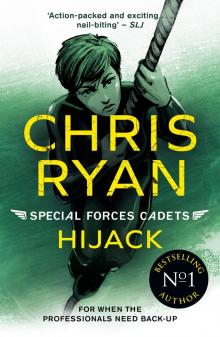 Hijack
Hijack Special Forces Cadets 2
Special Forces Cadets 2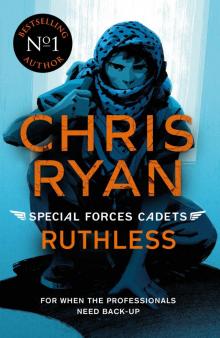 Ruthless
Ruthless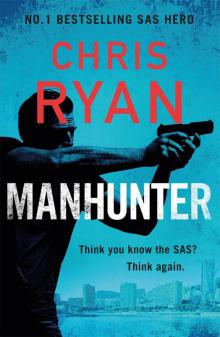 Manhunter
Manhunter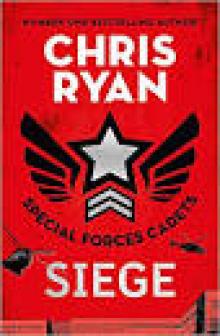 Special Forces Cadets 1
Special Forces Cadets 1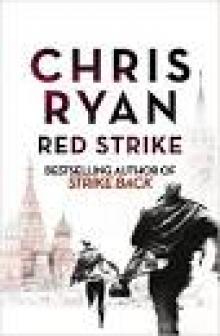 Red Strike
Red Strike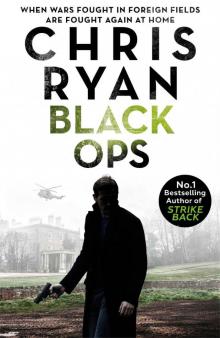 Black Ops
Black Ops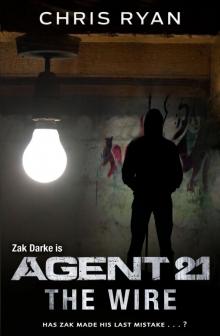 Agent 21: The Wire
Agent 21: The Wire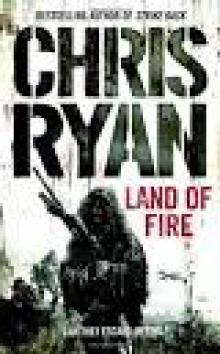 Land of Fire
Land of Fire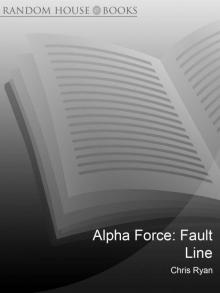 Alpha Force: Fault Line
Alpha Force: Fault Line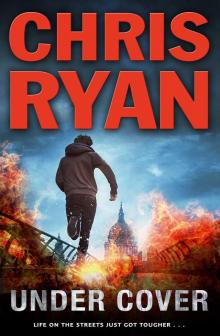 Under Cover (Agent 21)
Under Cover (Agent 21)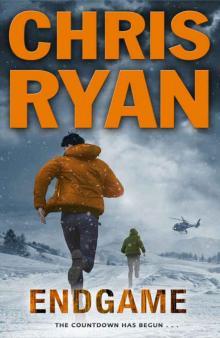 Endgame (Agent 21)
Endgame (Agent 21) Red Centre
Red Centre Blackout
Blackout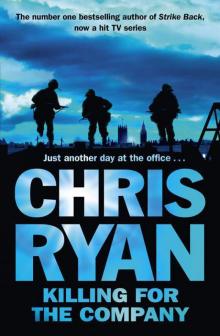 Killing for the Company
Killing for the Company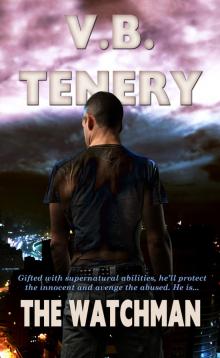 The Watchman
The Watchman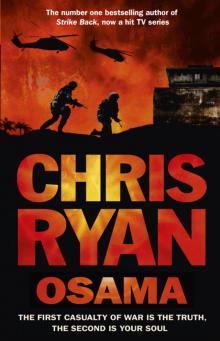 Osama
Osama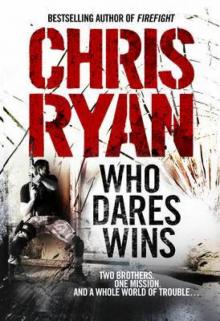 Who Dares Wins
Who Dares Wins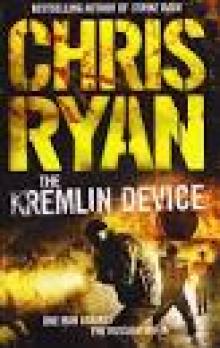 The Kremlin Device
The Kremlin Device Hunter Killer
Hunter Killer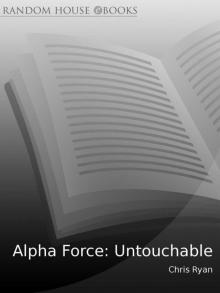 Alpha Force: Untouchable
Alpha Force: Untouchable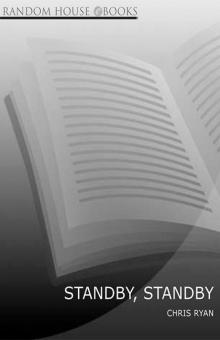 Stand By Stand By
Stand By Stand By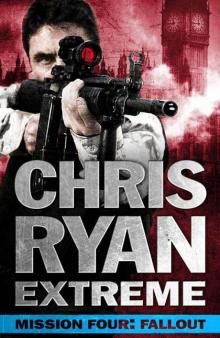 Chris Ryan Extreme: Hard Target: Mission Four: Fallout
Chris Ryan Extreme: Hard Target: Mission Four: Fallout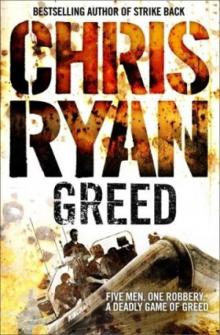 Greed mb-1
Greed mb-1 Alpha Force: Desert Pursuit
Alpha Force: Desert Pursuit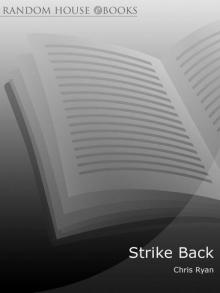 Strike Back
Strike Back Greed
Greed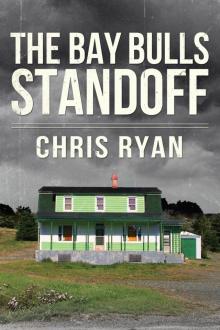 The Bay Bulls Standoff
The Bay Bulls Standoff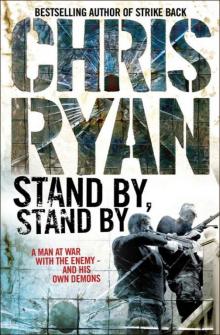 Stand By, Stand By gs-1
Stand By, Stand By gs-1 Outbreak
Outbreak Hunted
Hunted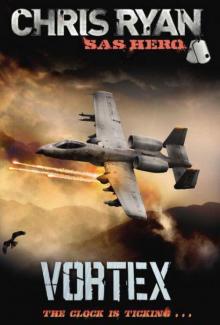 Vortex cr-4
Vortex cr-4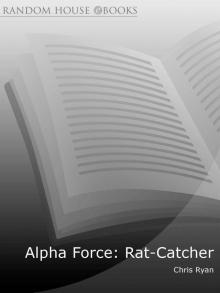 Rat-Catcher
Rat-Catcher Vortex
Vortex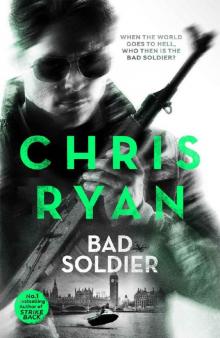 Bad Soldier
Bad Soldier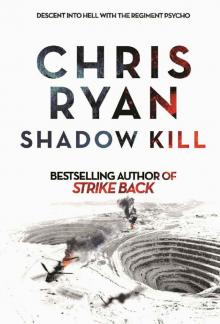 Shadow Kill: A Strikeback Novel
Shadow Kill: A Strikeback Novel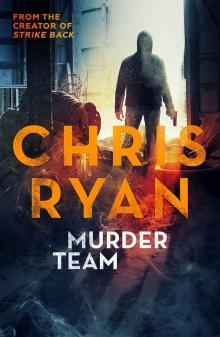 Murder Team (Kindle Single)
Murder Team (Kindle Single) One Good Turn
One Good Turn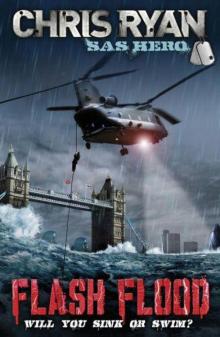 Flash Flood cr-1
Flash Flood cr-1 Night Strike
Night Strike Wildfire
Wildfire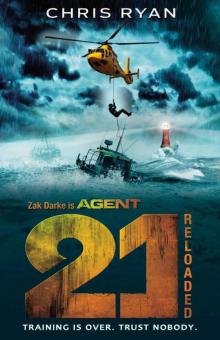 Agent 21: Reloaded: Book 2
Agent 21: Reloaded: Book 2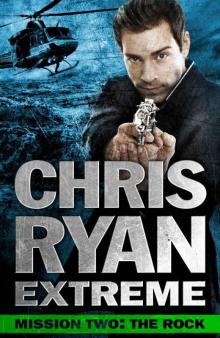 Chris Ryan Extreme: Hard Target: Mission Two: The Rock
Chris Ryan Extreme: Hard Target: Mission Two: The Rock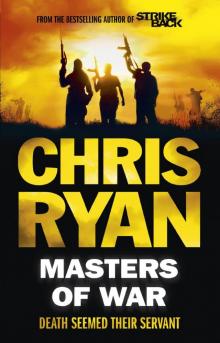 Masters of War
Masters of War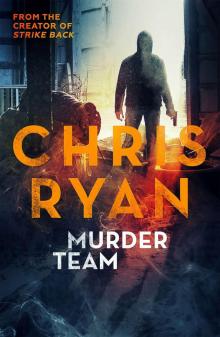 Murder Team
Murder Team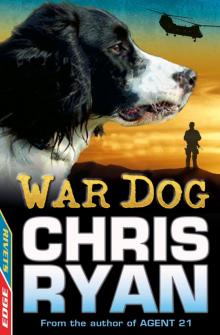 War Dog
War Dog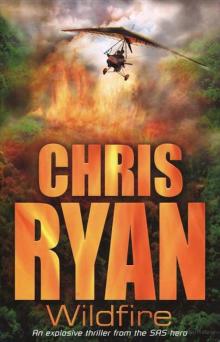 Wildfire cr-2
Wildfire cr-2 Survival
Survival The One That Got Away - Junior edition
The One That Got Away - Junior edition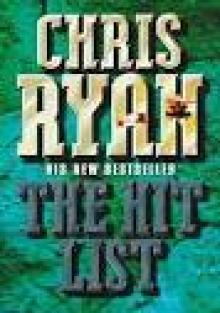 The Hit List
The Hit List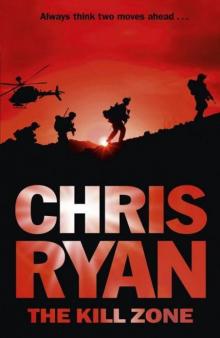 The Kill Zone
The Kill Zone Medal of Honor
Medal of Honor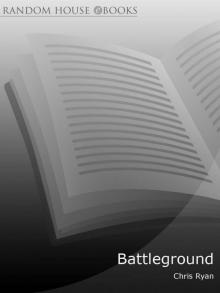 Battleground
Battleground Twister
Twister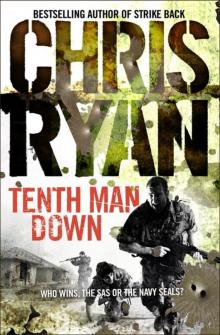 Tenth Man Down gs-4
Tenth Man Down gs-4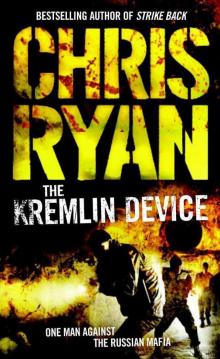 The Kremlin Device gs-3
The Kremlin Device gs-3 Hostage
Hostage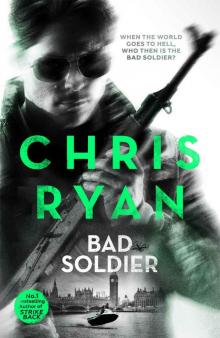 Bad Soldier: Danny Black Thriller 4
Bad Soldier: Danny Black Thriller 4 Alpha Force: Blood Money
Alpha Force: Blood Money Firefight
Firefight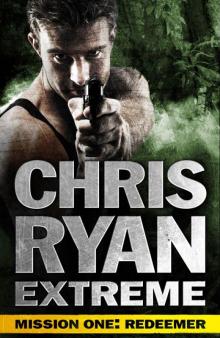 Chris Ryan Extreme: Hard Target: Mission One: Redeemer
Chris Ryan Extreme: Hard Target: Mission One: Redeemer Hit List
Hit List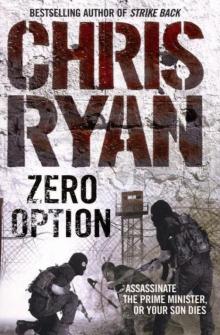 Zero Option gs-2
Zero Option gs-2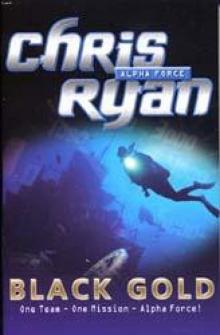 Black Gold
Black Gold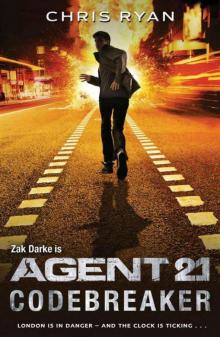 Agent 21: Codebreaker: Book 3
Agent 21: Codebreaker: Book 3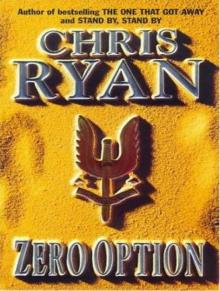 Zero Option
Zero Option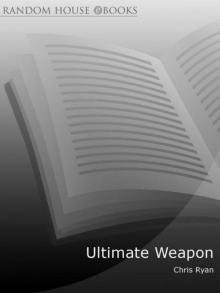 Ultimate Weapon
Ultimate Weapon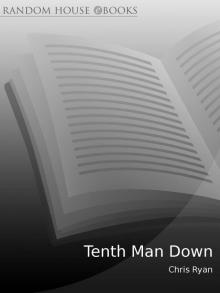 Tenth Man Down
Tenth Man Down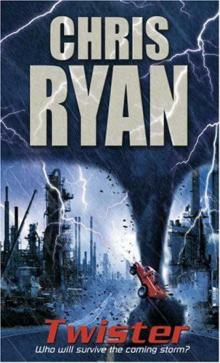 Twister cr-5
Twister cr-5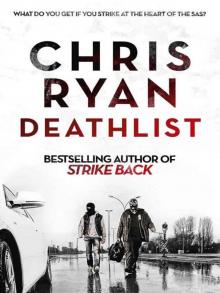 Deathlist
Deathlist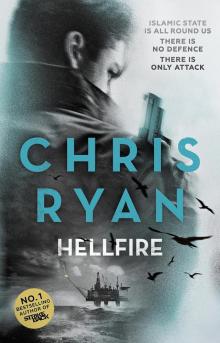 Hellfire
Hellfire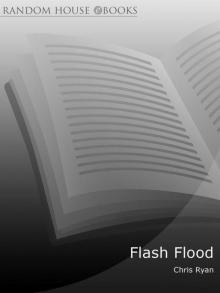 Flash Flood
Flash Flood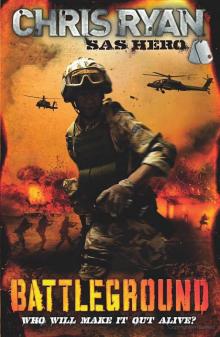 Battleground cr-6
Battleground cr-6 The Increment
The Increment